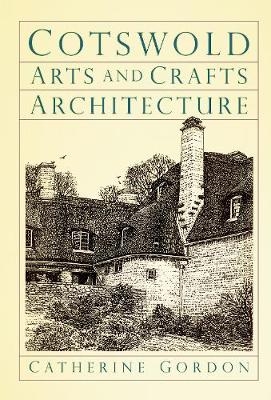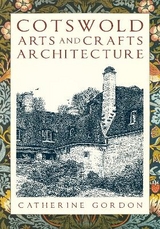
Cotswold Arts and Crafts Architecture
Seiten
2009
Phillimore & Co Ltd (Verlag)
978-1-86077-548-2 (ISBN)
Phillimore & Co Ltd (Verlag)
978-1-86077-548-2 (ISBN)
- Titel erscheint in neuer Auflage
- Artikel merken
Zu diesem Artikel existiert eine Nachauflage
A history of Cotswold art & architecture
Between 1890 and 1930, Arts and Crafts architecture proliferated within the Cotswolds. The range and quality of the buildings was exceptional as the region provided the perfect environment for the Movement’s ideals and principles. Arts and Crafts architects relished the robust vernacular precedent as it channelled their ideas and stimulated their imaginations. Its rational basis and dependence on craft skills had lasting value, and it was no coincidence that the most influential aspect of their work was its emphasis on conservation.
The Arts and Crafts Movement in the Cotswolds has attracted much interest in recent decades, the appeal of the simple life and of traditional values detached from the pressures of modern society having as much allure now as it did a century ago. Most of these studies have referred to the work of architects in the region, but the subject has not received the specialist attention it deserves. Until now. This book examines the impact of the Movement on the Cotswold landscape, on the survival of its building traditions and on modern attitudes to building conservation. After an introductory section which outlines the Movement’s origins and beliefs and its architectural principles, the main part of the book provides a guide to the general characteristics associated with Arts and Crafts building in the Cotswolds.
There are separate chapters on the various types of new commission that were undertaken, from small and large country houses and cottages to village halls and almshouses, not to mention the numerous repair and remodelling jobs on existing buildings that had become derelict following the social and economic upheavals of industrialisation. The final chapter looks at the late flowering of architectural work in the region during the interwar period and beyond, and the legacy of this important body of work at a local and national level.
Between 1890 and 1930, Arts and Crafts architecture proliferated within the Cotswolds. The range and quality of the buildings was exceptional as the region provided the perfect environment for the Movement’s ideals and principles. Arts and Crafts architects relished the robust vernacular precedent as it channelled their ideas and stimulated their imaginations. Its rational basis and dependence on craft skills had lasting value, and it was no coincidence that the most influential aspect of their work was its emphasis on conservation.
The Arts and Crafts Movement in the Cotswolds has attracted much interest in recent decades, the appeal of the simple life and of traditional values detached from the pressures of modern society having as much allure now as it did a century ago. Most of these studies have referred to the work of architects in the region, but the subject has not received the specialist attention it deserves. Until now. This book examines the impact of the Movement on the Cotswold landscape, on the survival of its building traditions and on modern attitudes to building conservation. After an introductory section which outlines the Movement’s origins and beliefs and its architectural principles, the main part of the book provides a guide to the general characteristics associated with Arts and Crafts building in the Cotswolds.
There are separate chapters on the various types of new commission that were undertaken, from small and large country houses and cottages to village halls and almshouses, not to mention the numerous repair and remodelling jobs on existing buildings that had become derelict following the social and economic upheavals of industrialisation. The final chapter looks at the late flowering of architectural work in the region during the interwar period and beyond, and the legacy of this important body of work at a local and national level.
CATHERINE GORDON undertook a survey of the Arts and Crafts buildings in the Cotswolds, the results of which were published as a gazetteer in conjunction with Cheltenham Art Gallery and Museums and formed the subject of her PhD thesis. She works as an historic building consultant and has contributed to various publications, including a history of Chipping Campden and a history of the Earls of Coventry and the Croome estate. She spends much of her spare time in the Cotswolds and this book represents a reappraisal of a favourite subject and a welcome return to familiar places.
| Erscheint lt. Verlag | 4.5.2009 |
|---|---|
| Verlagsort | Stroud |
| Sprache | englisch |
| Maße | 165 x 235 mm |
| Gewicht | 320 g |
| Themenwelt | Kunst / Musik / Theater ► Kunstgeschichte / Kunststile |
| Sachbuch/Ratgeber ► Geschichte / Politik ► Regional- / Landesgeschichte | |
| Technik ► Architektur | |
| ISBN-10 | 1-86077-548-9 / 1860775489 |
| ISBN-13 | 978-1-86077-548-2 / 9781860775482 |
| Zustand | Neuware |
| Haben Sie eine Frage zum Produkt? |
Mehr entdecken
aus dem Bereich
aus dem Bereich
von der osmanischen Eroberung bis zur Gründung des Staates Israel
Buch | Softcover (2023)
C.H.Beck (Verlag)
CHF 26,50
Russen und Ukrainer vom Mittelalter bis zur Gegenwart
Buch | Softcover (2023)
C.H.Beck (Verlag)
CHF 25,20



